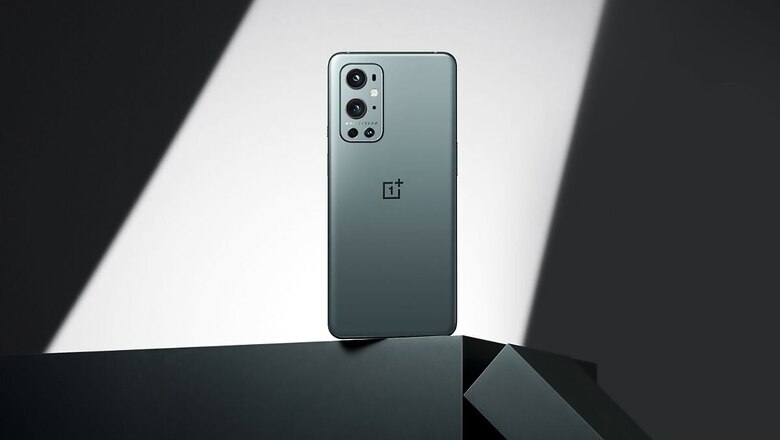
views
The OnePlus 9 Pro was, by all means, hailed by critics as a good phone. That’s pretty much the rhythm every year, when OnePlus introduces a new flagship smartphone. However, not all may be as well as what the brand and its ardent followers would likely hope for. According to a report by AnandTech, the OnePlus 9 Pro has a major software issue where it deliberately throttles the performance of numerous mainstream applications but allows benchmarks to run without any performance cap – thereby essentially misrepresenting the true performance capabilities of the flagship grade device.
Throttling apps: The AnandTech study
The AnandTech report details how the OnePlus 9 Pro, a flagship smartphone running on the flagship Qualcomm Snapdragon 888 SoC, appears to return rather poor benchmark scores when it comes to browser performance. The scores, as the report highlights, are about 10 percent to 60 percent of what other flagship smartphones appear to be able to achieve. A deeper dive seemingly reveals a set of instructions within the OnePlus OxygenOS software, which specify the device to cap the peak performance abilities for a large number of apps – a list that AnandTech states covers most popular apps on the Google Play Store.
When capping, the OnePlus 9 Pro appears to be restricting the ability for general apps from categories such as social media, productivity and web browsing to access the peak performance core, if need be. In fact, AnandTech states that when it comes to multi-tab browsing and scrolling through heavy web pages on popular browsers such as Google Chrome and Mozilla Firefox, the OxygenOS on OnePlus 9 Pro instructed the app to only use the efficiency cores on the Snapdragon 888 SoC, which are meant for light usage only.
The main issue that this can cause
Given that webpages and multi-tab browsing can become surprisingly heavy tasks, this may lead to hindered performance that is not representative of the OnePlus 9 Pro being a flagship device. This, AnandTech states, is exactly what happens, specifically mentioning that they noted “oddball benchmark numbers that portray the OnePlus 9 Pro as a early-2010’s budget device, with horrible performance.” AnandTech speculates that the reason behind deliberately throttling performance on most mainstream apps except for certain games and most benchmarks would be to obtain higher benchmark scores.
The latter, therefore, no longer remain representative of the phone’s real world performance, and managing the thermal performance, power efficiency and battery longevity. While benchmark scores being fudged is not anything new, and most users do not look at synthetic benchmark scores as anything more than a gross indication of where the phone stands in very rough comparison to others, it is the latter that some may find conflicting, since even these scores would not represent exactly how the OnePlus 9 Pro would perform in mainstream tasks such as streaming live matches, navigating, editing documents on the Microsoft Office app, scrolling through Instagram and browsing the web via Google Chrome or Mozilla Firefox – tasks that account for more than a majority share of your smartphone usage time.
What OnePlus says
News18 reached out to a OnePlus India spokesperson, who said on the matter, “Following the launch of the OnePlus 9 and 9 Pro in March, some users told us about some areas where we could improve the devices’ battery life and heat management. As a result of this feedback, our R&D team has been working over the past few months to optimise the devices’ performance when using many of the most popular apps, including Chrome, by matching the app’s processor requirements with the most appropriate power. This has helped to provide a smooth experience while reducing power consumption. While this may impact the devices’ performance in some benchmarking apps, our focus as always is to do what we can to improve the performance of the device for our users.”
In essence, OnePlus states that it is well aware of having throttled the performance on many mainstream apps. Not only that, OnePlus also claims that despite the throttling, the OnePlus 9 Pro should function just fine – in other words, its consumers should not feel the difference. In our review of the device, Vishal Mathur, associate editor, technology at News18, did not spot any performance irregularity in browsing or any other of the usual tasks. However, OnePlus does state that the “optimisation” was done after the launch, and given that our review of the device closely followed its official launch, it may have been possible that the update simply wasn’t live when we used it.
On OnePlus’ official forums, while there still are plenty of reports about heating issues on the OnePlus 9 Pro as well as bugs that crash various apps and services, there is little fodder around deliberate app throttling per se. This, therefore, makes for an interesting incident at the very least – especially considering how even Apple had once gotten into trouble for throttling performance to save battery life without disclosing the move to users – and paid a $500 million prize as a result.
Read all the Latest News, Breaking News and Coronavirus News here.




















Comments
0 comment